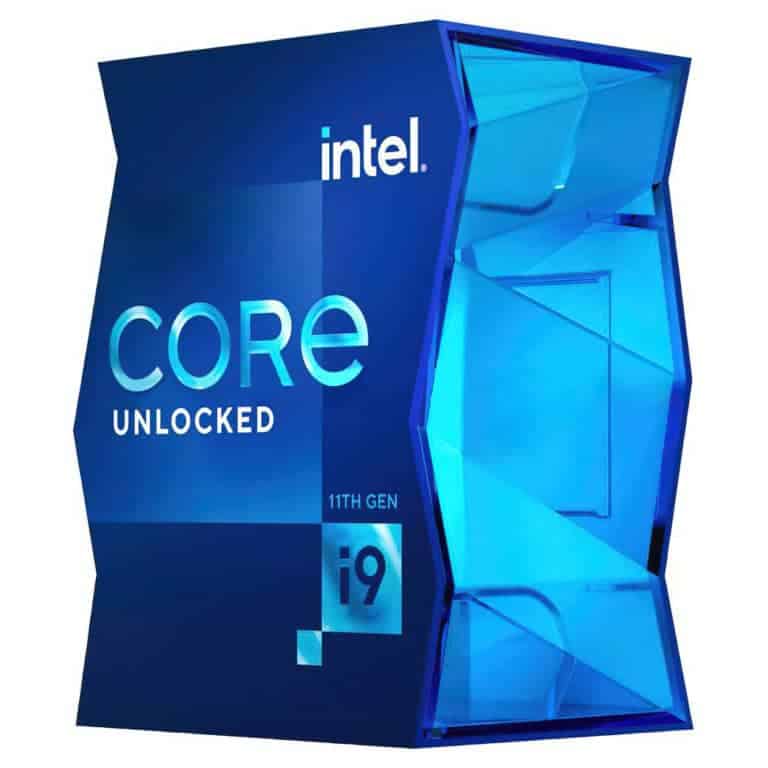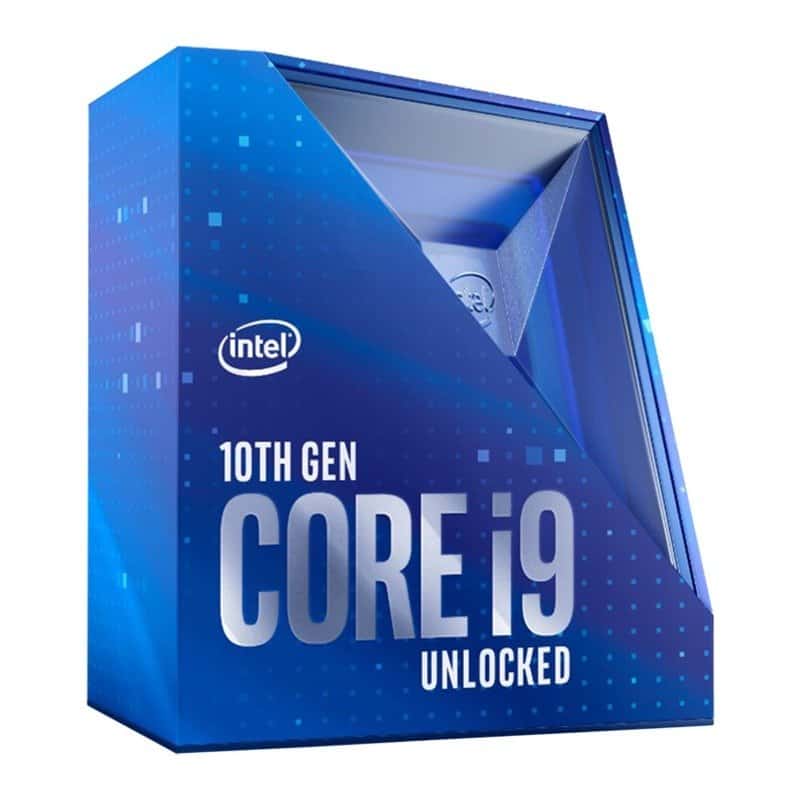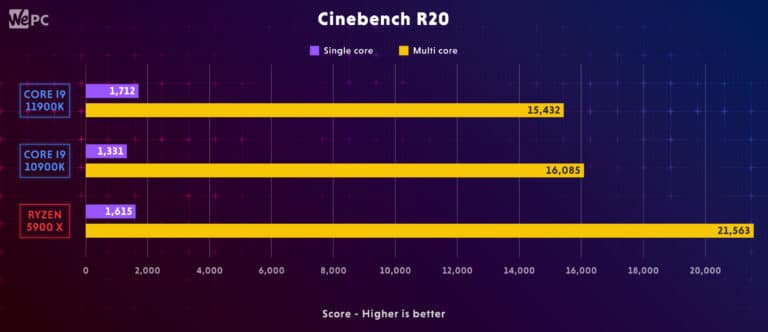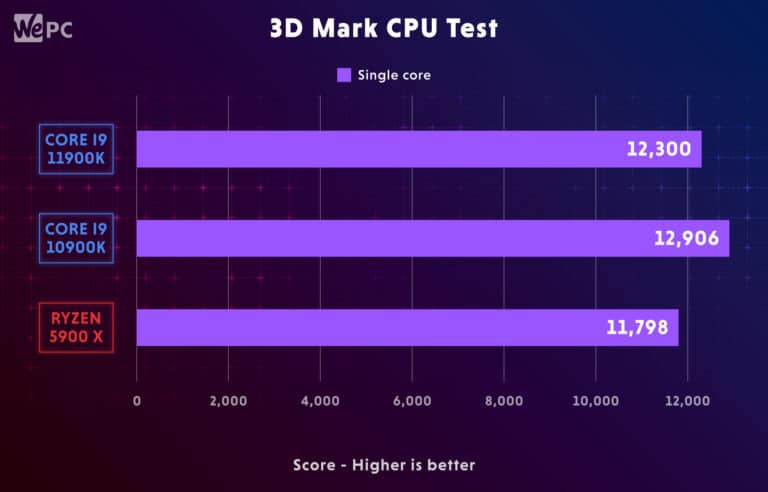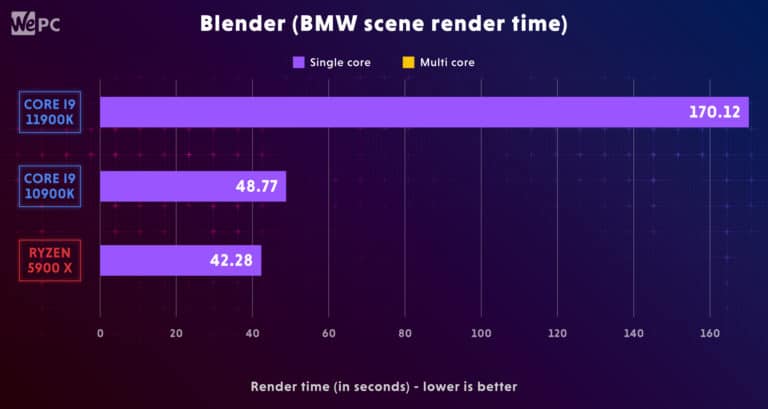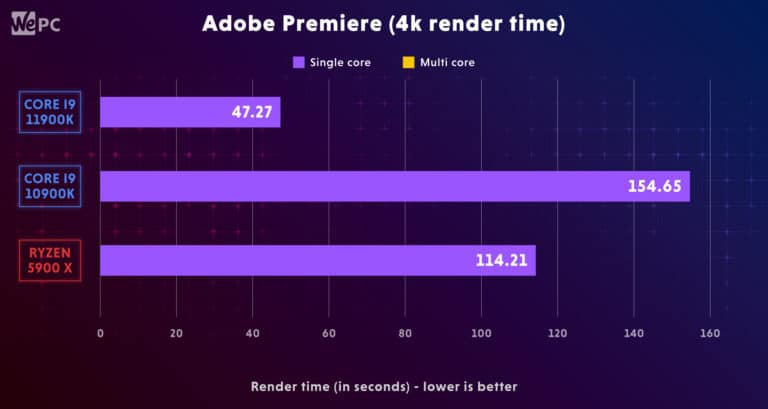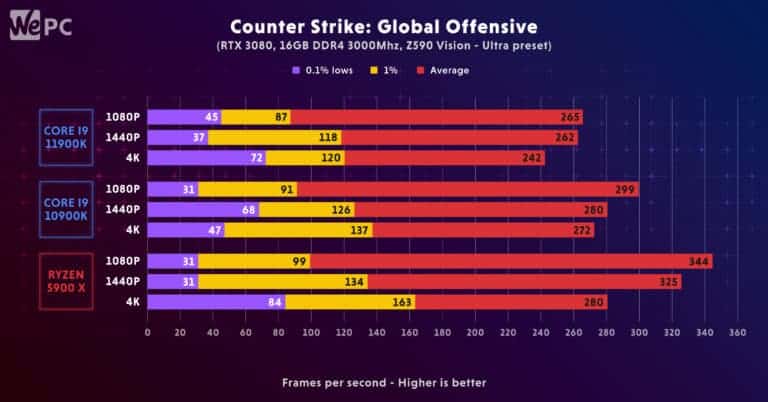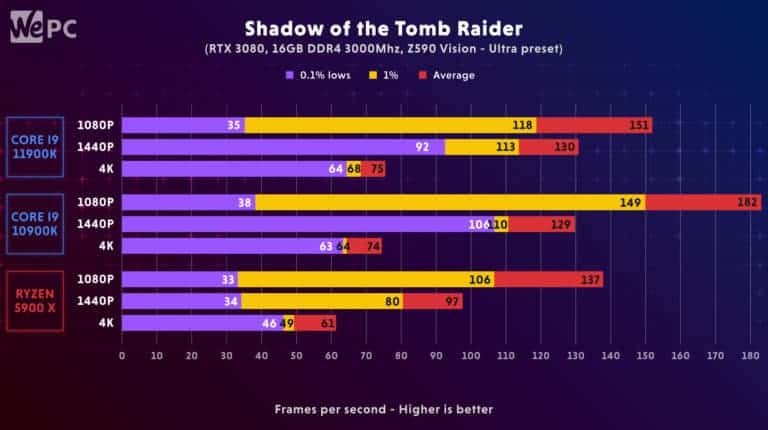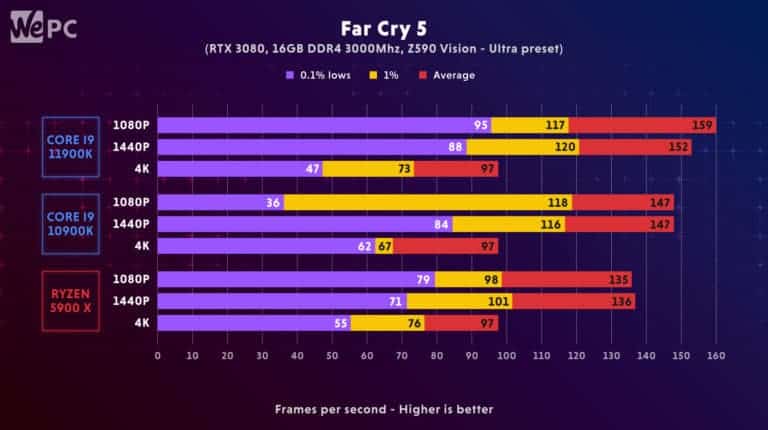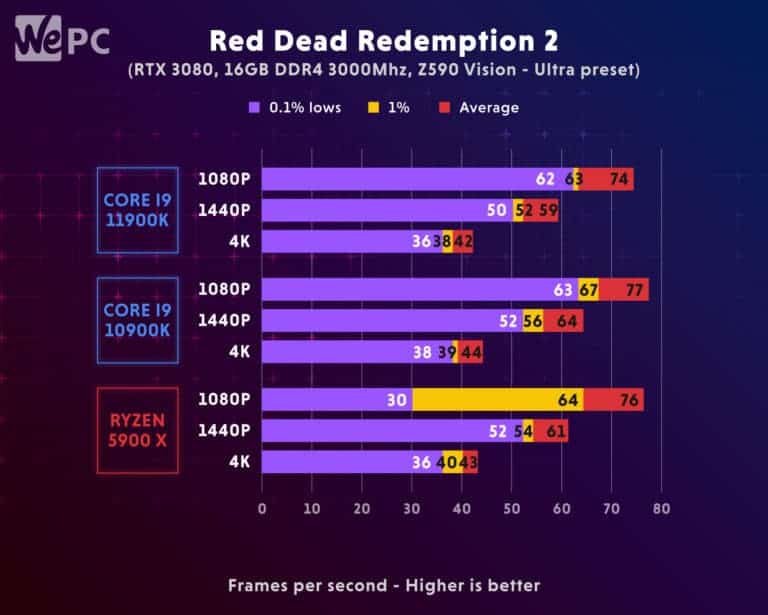Intel Core i9 11900K vs 10900K
We Compare The Newly Released 11th Gen Rocket Lake 11900K Against The 10th Gen Comet Lake 10900K
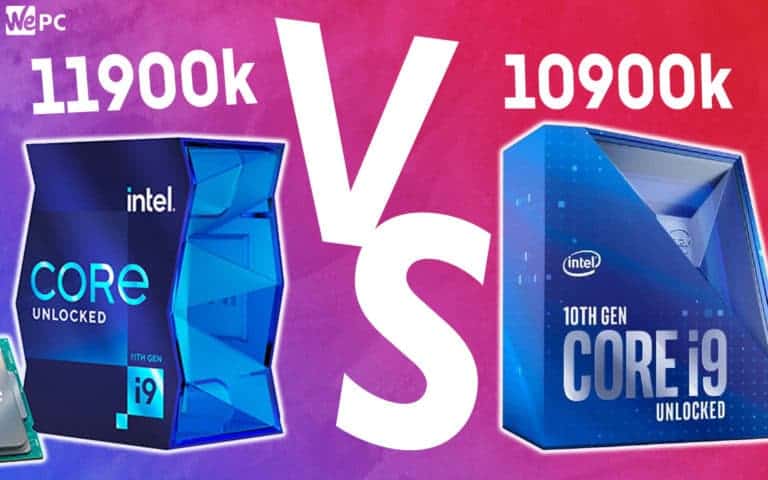
Edit – 01/05/2021 – Following BIOS updates from Intel, the performance of the 11900K has improved significantly from that shown below. Based on third-party testing, the CPU is now showing increases of up to and around 10% over the previous-gen 10900K on many games. We will be doing our own benchmarking to test this post-update performance ourselves; once we have, we will update the below figures accordingly.
Update – 30/03/2021 – The Intel 11th Gen Processors are out today! Click here to find a retailer.
The new Intel Core i9 11900K CPU has arrived! The new flagship processor from the blue team which aims to both improve on its previous big hitter, the 10900K and also challenge the flagship CPU of its rival – the AMD Ryzen 9 5900X.
We’ve put together a side-by-side comparison and review of the two Intel processors: 10th gen vs 11th gen, comet lake vs rocket lake.
Taking all of the relevant information, statistics, specifications, and most importantly, benchmarking results into consideration, this article takes a look at the older Intel Core i9 10900K and the new Intel Core i9 11900K to see what kind of step-up we are looking at (if any) in terms of both gaming performance and workstation tasks.
Intel Vs AMD
When it comes to the throne of games, Intel and AMD typically go back and forth to claim this top spot in computer processing units. These two competing brands have been at the forefront of CPU manufacturing since 2017 in a battle for a bigger share of the market.
The upcoming release of the i9 11900K provides another opponent for AMD’s 5900X CPU, which is a processor from the Ryzen 5000-series that posed a brief interruption to Intel’s formerly unrelinquished hold over the CPU gaming market. Is this Intel’s chance to regain what was momentarily lost?
When it was first introduced with the 2020 rollout of Intel’s 10th Generation CPUs, the Intel Core i9 10900K was considered their flagship product and was marketed as one of their most powerful CPUs to date. Now that the Intel Core i9 11900K has been confirmed as the flagship 11th Generation CPU, how do these two processors compare?
Keep reading to find out! Or alternatively, for a more in-depth discussion, see our 11900k vs 5900X article here.
11900K vs 10900K Specifications
The below is a comparison of the specifications of the Intel 11900K and 10900K, and also the AMD Ryzen 9 5900X for reference.
| Intel i9-10900K | Intel i9-11900K | AMD Ryzen 9 5900X | |
|---|---|---|---|
| Speed (Boost) | 3.70 GHz (5.30 GHz) | 3.50 GHz (5.30 GHz) | 3.70 GHz (4.80 GHz) |
| Cores (Threads) | 10 (20) | 8 (16) | 12 (24) |
| L3 Cache | 20 MB | 16 MB | 64 MB |
| L2 Cache (per core) | 256 KB | 512 KB | 512 KB |
| L1 Cache (per core) | 64 KB | 96 KB | 64 KB |
| TDP | 125 W | 125 W | 105W |
| process size | 14 nm | 14 nm | 7nm |
| RRP | $488 | $539 | $549 |
Clock Speed
The most important factor that typically influences a CPU’s performance in gaming is clock speeds, the being the case the lack of improvement in this area for the new processor initially appears puzzling.
Intel Core i9 10900K has a base clock speed of 3.7 GHz Max Turbo and has a TBMT 3.0 Clock speed of 5.3 GHz, which is actually faster in terms of base clock than the Core i9 11900K. The latter chip has a base clock speed of 3.5 GHz and a boost of 5.3GHZ, which just about covers the sweet spot for gamers, however the lack of improvement here may surprise some people. Ultimately the 11900K relies on architectural improvements, including on its cache, to drive the improved performance.
Additionally, although we haven’t tested it yet, the Thermal Boost technology of the new CPU means overclockers can stretch it further, but this remains to be seen. With either CPU you’ll enjoy seamless gameplay even when the pace picks up, and you can stay one step ahead of your opponents with fast response times.
Cores and Threads
Broadly speaking, more cores means better performance in those tasks which rely on multi-core performance, which tends to be primarily workstation tasks (3D rendering, video editing, music production etc.). The latest games are increasingly using more and more cores, though generally it’s still of lesser importance in gaming compared to clock speed.
Both of these Intel CPUs are equipped with hyper-thread technology. The cores are essentially split into threads which act as virtual cores to provide double the processing power, meaning they can run multiple applications at the same time without it causing a drop in performance or quality.
Intel’s 10th Generation processors offered a huge multicore improvement compared to the earlier series of CPUs, with even the most basic 10th Gen model being equipped with more threads than the most advanced 9th Gen product. The Core i9 10900K has 10 cores and 20 threads which is more than enough to handle gaming purposes, arguably more than you need, but gives it the power needed for dual-use systems that engage in workstation tasks.
The 11th Gen however goes in the opposite direction and has 2 fewer cores than the Core i9 10900K with just 8 to run on and 16 threads. This might seem counterintuitive at first but most games don’t even use the full core count of the 10900K. Intel’s strategy with the newer chip is to provide more of a focus on the efficiency of the card in gaming uses and general single-core performance tasks over workstation users, as brought about through improvements made to the general architecture.
Consequently, the 10900K is the preferred option for workstation users (see our benchmarking below for the evidence of this) and having more threads than you currently need for contemporary games is arguably a great way to future-proof your computer processor to save you needing to upgrade in a few years time.
Architecture And Cache
One of the things that has people so excited about the 11900K’s release is the debut of Intel’s new Rocket Lake architecture, which comes after over 5 years of an arguably stagnant period in terms of architectural improvements and development. Is this a case of slow and steady wins the race, and if so, is Intel about to wow us with something special?
We were certainly happy to hear that it features the latest PCIe 4.0 connection and it’s now backward-compatible, meaning it can be used with the LGA 1200 socket or with the new X590 chipset that is currently in development. It also supports the newer DDR-3200 RAM memory type which is more advanced than the 10900K but shared by AMD’s Ryzen 5900X.
The Core i9 10900K features Comet Lake architecture which is a 4th Gen Skylake chip produced using a 14nm process. It offers an improvement on the i9 9900K with two extra cores and faster clock speeds, as well as supporting DDR4-2933 RAM memory storage type.
Although the total L3 cache is higher in the older 10900K, as the 11900K has fewer cores the amount per core is essentially the same (2MB). Where the newer CPU has the advantage however is the 100% greater L2 cache per core (512KB vs 256KB) and 50% greater L1 cache (96KB vs 64KB). Theoretically, this should mean smoother gameplay in the newer generation CPU thanks to better minimums.
The Xe architecture is apparently supposed to deliver up to 50% more integrated graphics power for those that aren’t using a separate dedicated graphics card.
Workstation Performance Benchmarks
The lower core and thread count of the 11900K compared to the 10900K clearly puts it at a disadvantage when it comes to the majority of workstation processes, which are typically (though not always) more reliant on multicore performance.
AMD is the leader when it comes to workstation CPUs and Intel have clearly decided to focus on the area where they feel they can compete – in gaming – which is less reliant on multiple cores.
As you can see from the above benchmarking tests, the i9-11900K fell short of both the 10900K and the AMD Ryzen 9 5900X in the Cinebench multicore tests, being 4% less effective compared to the 10900K (not a massive difference) and 28% less effective than the AMD CPU. Significantly slower render times in our Adobe 4K and Blender tests are also the result of this.
In those processes which prioritize single-core performance however, the 11900K excelled.
Gaming Performance Benchmarks
Rumors regarding the 11900K spoke about a 32% improvement in single-core performance over the 10900K, but based on our testing this seems to have been highly optimistic.
The 11900K actually underperforms the older CPU in some of the games we tested it on, producing lower FPS in titles like Shadow Of The Tomb Raider and CS:GO, producing more or less similar results in Red Dead Redemption 2 and narrowly winning out in FarCry 5.
So what’s the reason for this? Present thinking is that, given the CPU has only just been released, the underperformance is the result of compatibility issues and that further BIOS and firmware updates will unlock the true potential of the chip. For now, it’s a game of wait and see, but the early results are certainly disappointing!
Verdict - Which Should You Buy?
At the time of writing, on the official release date of the 11900K, the CPU certainly does not achieve what Intel set out to do – deliver solid single-core performance that prioritizes gamers over workstation users.
Cutting down the number of cores compared to the 10900K, along with other advancements in the architecture, is supposed to give it an edge in this area over the older 10th gen CPU, but on release the 11900K underperforms its previous-gen cousin, and for around $50 higher RRP.
It may be that further BIOS and firmware updates change this story, in which case we will update this page accordingly. If you can wait without buying a CPU for the next few months then, we would advise you do so and see what comes. This is even more so the case if you’re a keen overclocker and want to push the 11900K to the max Ghz possible.
If you want a dual-use workstation CPU however the decision is clear cut: the 10900K will still have the edge, whatever software updates to the 11900K may bring, thanks to its multiple cores, so we’d either consider going with this or, even better, one of the rival AMD processors.
Although we have briefly touched upon some comparisons of Intel’s 11900K vs the flagship CPU of their rival, the AMD 5900X, for a more in-depth comparison of the two processors see here for our other article on the subject.





